- Home
- Jana Oliver
Madman's Dance (Time Rovers) Page 28
Madman's Dance (Time Rovers) Read online
Page 28
“Try to get back to the middle of October, I guess.”
“Don’t bother. I suspect you won’t be allowed.”
Her mouth dropped open. “But that screws up everything I planned!”
“So?” he chided. “You’re a Rover. Think on your feet for a change.”
Jerk. He’d been cranky ever since she mentioned the Winston woman.
“Well, maybe I can call in a few favors. Flaherty has to come forward and save Keats.”
Defoe snorted. “You’re a fool if you think he’ll do that.”
That did it. No one called her a fool, even the Father of Time Travel.
“So what are you going to do, then?”
He closed his interface and tossed money on the table, not bothering to answer. “Let’s get out of here.”
Right before they made their transfers, Cynda dug out the business card from the hotel. “I’m at the Arundel at Victoria Embankment.” He didn’t write any of it down. That she envied. As she started to say goodbye, he triggered his interface and was gone.
“He’s a piece of work,” her delusion said.
“Yeah, he is.”
The moment the transfer stabilized, she checked the interface. November fourth, the day she’d checked into the hotel. She made a beeline toward the closest newspaper boy, exasperated she had to use newsprint as a means to verify the date. Both the paper and the technology agreed. At least that was a start.
“Time for Plan B,” she muttered. Whatever the hell that is.
~••~••~••~
So many times he’d been in this room awaiting Adelaide’s arrival, always with a mixture of elation and heady desire. Tonight was different. She had never mentioned she was a member of the Twenty, never indicated she had a loyalty to anyone but herself. Likewise, he’d only shown her Malachi Livingston’s form, not his real one. More than once he’d wanted to bare his soul, tell her he was really Harter Defoe, a man from the future. He’d never been able to take that leap of faith.
Neither of them had been totally honest, and that made it worse.
The door opened and she hurried into the room. Adelaide never hurried in any fashion.
“Malachi?” When he did not offer his hand in their special greeting, she halted abruptly. “Is it truly you?”
Only then did he take her hand and make the sign in her palm. She returned it.
“Thank heavens,” Adelaide said. “No one has heard from you in over a week. I was so worried.”
“I was indisposed,” he responded coolly, stepping back.
“Even your assistant, William, was concerned about you, as well. He came calling the other day to ask after you. Where have you been?”
“Recuperating—someone tried to kill me.”
Horror filled her face. “He said he’d—”
Defoe held his tongue, forcing her to speak.
Adelaide regained her composure. “Only this morning, I learned that the Ascendant has ordered your death, for no apparent reason. I urged the Lead Assassin to slow the process so I might have time to warn you.”
“I was injured almost a week ago,” Defoe informed her with a frown.
Confusion clouded her face. “That does not follow with what he told me.”
Defoe didn’t bother to explain he had enemies in two different centuries. “Since when does the Lead Assassin speak so openly about murder?”
Adelaide sank into a nearby chair with an agitated rustle of silk. “I pray that you will forgive me for what I am about to tell you.”
She was afraid. Of me, or her master?
“I am a member of the Twenty, Malachi. I am the Intermediary between that body and the Ascendant. I do not readily reveal that fact to anyone. The longer I have known you, the more I’ve come to realize you’re an honorable man, and now I regret not having shared that confidence earlier.”
She sounds so sincere.
“Once this crisis is over, I intend to resign from the Twenty and go to Paris. I have already found someone to purchase the house and the furniture.” She looked directly at him, pleading in her voice. “I intend to start over, Malachi. I sincerely pray you will join me.”
He pushed aside her offer. “What crisis?”
She paused for a moment, struggling with the change that had come over him. “The Ascendant is playing us, one and all,” she explained. “If we do not have a satisfactory answer out of him by mid-week, he will be replaced. The Lead Assassin is in agreement with me on this point. We cannot risk exposure.”
“Who is he?”
He expected her to refuse him that information, but she did not hesitate. “His name is Hezekiah Grant. He is, by most points, a somber and pious man. However, as of recent he has begun to act quite oddly.”
“What is behind all this?”
“The Ascendant said that we had the opportunity to obtain some explosives that we might pass onto certain sympathetic Transitives in Russia.”
“Why stir up trouble with them?” he asked.
“We believe the rise of certain factions will not prove advantageous for Britain. Our loyalty is not only to our kind, Malachi, but also to our nation. The Twenty discussed it and decided the plan had value. Then he enlisted that anarchist, Flaherty, to steal the explosives, even going so far as to kidnap the man’s daughter to hold him in check.”
“That was not part of your plan?”
“Heavens no,” she said. “I can only imagine the terror in that child’s heart. We are very upset at this news. It is clear now that he does not intend to convey this merchandise to the appropriate people but has his own scheme for its use.”
“How many of the Twenty do you know by name?”
“Only a few. We hold privacy as our greatest shield. I suspect the Lead Assassin knows some of the others as well.”
“What of him?”
“I must admit I first thought him an abomination. My opinion has changed as of recent. His true name is hidden from us.”
Defoe had one last question. If he did not ask it, he would implode. “Do you truly love me, Adelaide, or was it all a ruse to make me trust you?”
Her eyes misted over as she nodded. “Yes, I do love you. I realized very early on that our trysts were more than just the pleasure between a man and a woman.”
In the beginning, he’d not come to this house for anything but time spent with a beautiful courtesan, one of the perquisites of the job. The nights he’d spent with Adelaide had changed his mind. A few hours in her arms were not enough. He wanted more.
“Does the Lead Assassin know of your feelings?” he quizzed, still unsure of her loyalty.
“I suspect he does.”
“Was he one of your gentlemen?” Defoe asked peevishly.
“Not that I am aware.”
“Will the Lead Assassin try to fulfill his contract against me?”
“He will have to, eventually, or face being killed himself. If he delays, there is no guarantee the Ascendant will not dispatch another. Apparently, he has already done so in another matter.”
“I see.”
Adelaide rose. “I will press for the Ascendant’s removal. I will not risk your life, Malachi.”
He drew her close to him, wincing when she put her hand on his healing wound. She laid her head on his chest. This was not a courtesan with a customer, but a trembling lover, fearing rejection. He had encountered many lying women over the centuries.
His heart told him that Adelaide Winston was not one of them.
~••~••~••~
Monday, 5 November, 1888
Newgate Prison
Keats stared at the ceiling, waiting. His pocket watch rested on his chest, the cover open so he could consult the dial. In a few short minutes it would be his birthday, but there was little cause for celebration. Last year he’d been a blissfully happy man, having just successfully completed a complicated case involving international forgers. Now he was thirty-three years old, and had fallen further than even his father co
uld imagine.
The cell door opened and Alastair entered. Keats swung his feet over the edge of the bed, surprised to see his friend so early in the morning.
“I know you’re probably not in the mood,” Alastair said with a muted smile, “but I did want to visit you on your birthday.”
He remembered. “Not much to celebrate, is there?”
“That remains to be seen,” was the reply. The doctor turned to the two guards. “May we have some privacy? I need to examine the prisoner’s wounds.”
Once the door closed behind the pair of them, Alastair took a seat on the bench, placing his Gladstone and a newspaper next to him. He gestured for Keats to remove his coat and shirt.
“There’s no point,” Keats protested, working on the shirt buttons. “Tomorrow morning, it will no longer matter.”
Alastair didn’t reply as he continued his examination, carefully palpating along the broken rib. “Healing very nicely,” he remarked. “Your head wound is much improved. There’s still a scar, but your hair hides most of it.”
“Stop being so damned positive, will you?” Keats barked. “We both know—”
“Until that final moment, I will keep hope,” Alastair thundered back. “You can be all gloomy if you want, and Lord knows you have the right, but nevertheless I feel this will be resolved.”
“How can you be so sure?” Keats asked.
“Jacynda has returned. I received a note from her late last night.”
He started in surprise. “Is she herself now?”
“It would appear so. The letter was most coherent. If she can be restored to us, so can you. She’ll not let you hang, Keats.”
For an instant, he felt hope. “So you say,” he conceded, pulling on his coat. “How is Lord Wescomb?”
“Improving. He has been writing letters to everyone who carries any weight. And lest you think you’re forgotten…” Alastair handed off the morning paper.
Keats scanned the newsprint, then blurted, “They’re bringing the matter up in Parliament tomorrow morning?”
“Indeed. Questions are being asked in the newspapers as to why the explosives were not allowed into testimony. Why your execution is being rushed. Why the government is not providing any answers. The city is in an uproar.”
Keats tossed the paper aside. “It won’t matter. Parliament won’t convene until after I’m dead.”
“Perhaps enough pressure will be applied to stay the execution until we get this sorted.”
Keats scoffed. “You honestly believe that?”
“I refuse to give up on you,” Alastair said firmly. He packed his stethoscope into the Gladstone and snapped it shut. “I’ll be back this afternoon to see you.” He dug in his pocket and placed a pouch of tobacco on the bed. “Happy Birthday, my friend. May it be one of many more.”
“Thank you,” Keats answered softly, picking up the gift. “For everything.”
Chapter 3
A comfortable bed didn’t prevent Cynda from tossing and turning the entire night. After spending so much time formulating her plan it was being trashed by people she’d never met. It was bad enough TPB and Guv were messing with her life. Now there were the Futures, some vague group of people with their own devious agenda.
“Too bad, guys,” she murmured. “Mine takes precedence. Keats is not going to hang.”
To perk herself up, she ordered a big pot of coffee and some breakfast. After that, she’d start with the big dog. You should always have one of those in your corner.
The letter she penned to the Prince of Wales requested his assistance in a matter of extreme urgency. Since he believed she’d saved his life a few weeks earlier at Effington’s dinner party, the least he could do under the circumstances was send her a polite reply. If he ignored her, she’d have to track him down on her own. Finding the Royal would be easy compared to locating the anarchist.
Cynda began pursuing that thread. “Who wants Flaherty in prison?”
“The police,” Mr. Spider replied. He was nestling down on top of the linen napkin, as usual.
“The coppers for sure,” she agreed. “Who else?” Then she smiled. There was one person who’d want to see him swing: Johnny Ahearn’s widow. Nothing brought out the desire for vengeance more than having your husband’s throat cut, especially when you were left to raise a child alone.
She synced up with TEMnet and posed the question to Ralph. He came through with the address where the Widow Ahearn lived in Stepney.
Thanks. How’s it going there?
Not good. TPB knows you’re gone and has begun formal proceedings against the boss.
Oh, boy. Send him my best.
Will do. Pull this out of your hat, Cyn. We’re all counting on you.
No pressure there.
Will do. Later, guy. Log Off.
Logged off.
~••~••~••~
Cynda had always been in awe of women who were pregnant. They held mysteries inside of them she could not fathom. Would never fathom. That was one of the reasons why there were so few women Rovers: childbearing ceased to be an option once you began traveling through time. Something about hopping through the fourth dimension altered the ovaries, and not in a good way. The guys weren’t affected. Another inequity.
Cynda hadn’t expected a warm reception, but Johnny Ahearn’s widow didn’t even bother to invite her into the small hovel. Instead, Mrs. Ahearn leaned in the doorway, a protective hand on her vast belly. Given the girth, noticeable even under the full skirts, her time was near.
“I am a friend of Sergeant Keats,” Cynda began.
“The rozzer they’re gonna hang tomorrow?”
“Not if we can stop it.”
“What’s that got to do with me?” the woman asked, now frowning.
“I need to find Desmond Flaherty.”
The widow grew wary. “Why?”
“Because he can save my friend. Flaherty and a few of his men were with Keats the night of the murder. They can testify that he didn’t commit the crime.”
The widow rubbed her belly in thought.
“I only need one of them to come forward and tell the cops what happened,” Cynda pleaded. “Sergeant Keats is innocent. He can’t die, Mrs. Ahearn.”
“Why not?” the woman retorted. “My Johnny did. Someone cut his throat, did ya know that? Cut off his—”
“Someone? I thought Flaherty did it.”
The woman shook her head. “Not him.”
Now that’s interesting. “I’m sorry for your loss, but—”
“Loss? Ya know nothin’ of that,” the woman spat. “I’ll not save a rozzer. If ya want help, go to the priest.”
“What priest?”
“Nowlan.” With that, the door banged shut in her face. As Cynda turned away, she thought she heard the sound of weeping.
~••~••~••~
After ensuring the shawl covered her head, Cynda padded into the church. It wasn’t as grand as some of Europe’s mighty cathedrals, but she could still feel the divine power here. As she moved forward, she counted five heads bowed in prayer.
She stopped in front of the altar. Around her came the sputter of candles and the slight click of rosary beads, overlaid with hushed murmurs. Her eyes rose to the crucifix, to the face of the man from Nazareth.
Cynda slid into a pew and knelt in prayer. She’d never been very religious. She’d traversed time, witnessed religions at their best and their most cruel. Still, there was something out there she couldn’t quite fathom. Some called him God. Some said it was a Goddess. Others said it was multitudes of the same. Cynda had no idea what was the truth. She only knew that when things were very bad, someone was always there to comfort her.
When she finished her prayer for Keats, she looked up. The priest was older, his collar not as white as some she’d seen. Was it Nowlan? She doubted a church this small could afford two clerics.
“Are you all right, miss?”
“No, I’m not, Father,” she repl
ied quietly. “A dear friend of mine is going to die tomorrow. They’re going to hang him for a crime he didn’t commit.”
The priest’s face went expressionless.
“Flaherty knows he’s innocent. So does anyone else who was with him that night. Any of them could come forward and save him. I think you know at least one of them.”
Nowlan looked around and lowered his voice. “Ya should put yer faith in God, miss.”
“I do, Father, but I know God expects us to do the right thing. If not, what’s the point of all this?” she said, gesturing toward the altar.
No reply.
“You can help me make this right.”
Still no reply.
The priest was her only conduit to the anarchist. It was now or never. “Tell Flaherty I want to talk to him. I promise I’ll not sell him out to the police. He needs to hear what I have to say.”
The priest eyed her skeptically. “Why should I?”
“Because he has no one else who can help him now.”
A moment passed. Then Nowlan motioned for her to follow him. They left the church out a side door and into the night toward the graveyard in the back. He stopped in front of a mound of dirt. The crude headstone proclaimed it the final resting place of Johnny Ahearn. The father-to-be had been thirty-seven years old. His missus was much younger, maybe nineteen, if a day. Cynda couldn’t fault the widow for her bitterness.
“Did ya know him?” the priest asked quietly.
“No, I didn’t.”
In the far distance she heard a train’s whistle, low and mournful.
“Here’s the deal. I’ll help Flaherty find his daughter if he testifies about what happened that night in Whitechapel.”
Nowlan stared at her. “How can ya find his daughter when he can’t?”
“Because I know that there are others at work here.”
Their eyes locked in mutual understanding. Then the priest murmured under his breath and crossed himself. “Be back tonight, at six,” he told her. “If he wants to see ya, he’ll tell me. If not, we’ll pray together for yer friend’s life.”

 Mind Games
Mind Games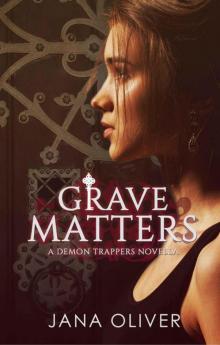 Grave Matters
Grave Matters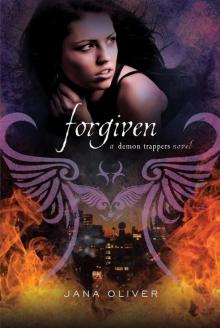 The Demon Trappers 3: Forgiven
The Demon Trappers 3: Forgiven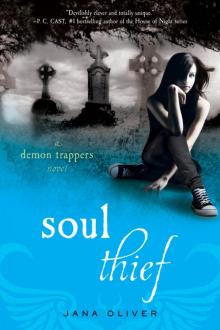 Forbidden
Forbidden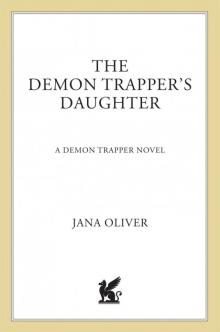 Forsaken
Forsaken Briar Rose
Briar Rose The Demon Trappers: Foretold
The Demon Trappers: Foretold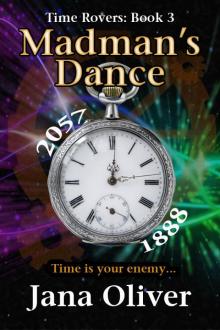 Madman's Dance (Time Rovers)
Madman's Dance (Time Rovers)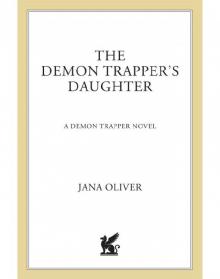 The Demon Trapper’s Daughter
The Demon Trapper’s Daughter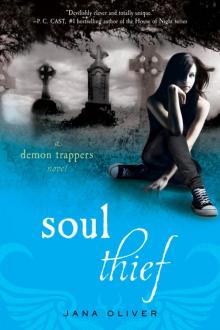 Soul Thief-Demon Trappers 2
Soul Thief-Demon Trappers 2 Mind Games (Demon Trappers Book 5)
Mind Games (Demon Trappers Book 5) The Demon Trappers: Forgiven
The Demon Trappers: Forgiven